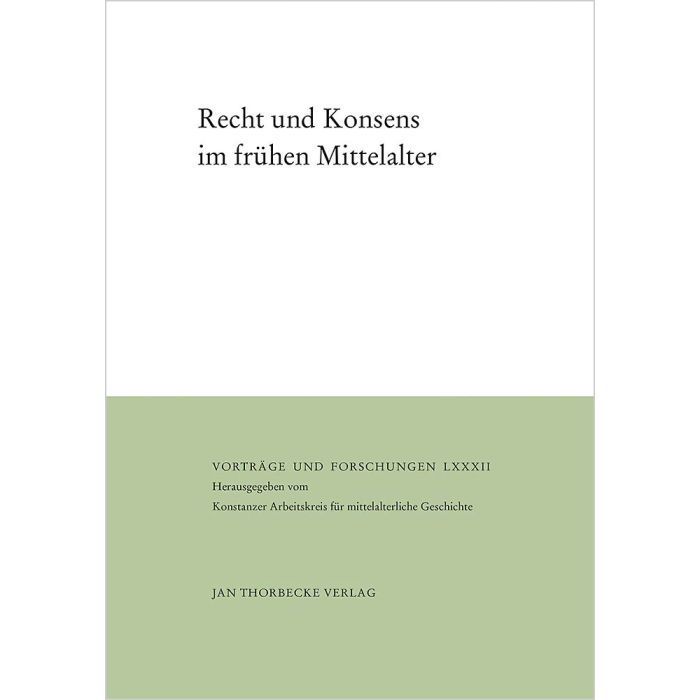Details stehen in den Datenschutzhinweisen.
Recht und Konsens im frühen Mittelalter
Vorträge und Forschungen, Band 82
Herausgegeben vom Konstanzer Arbeitskreis für mittelalterliche Geschichte
Herausgegeben vom Konstanzer Arbeitskreis für mittelalterliche Geschichte
54,00 €
Inkl. 7% MwSt. ,
exkl. Versandkosten
Auf Lager
lieferbar
Inhalt
Gab es konsensual, d.h. unter verantwortlicher Mitwirkung der Großen getragene politische Entscheidungen im Frühmittelalter? Durchaus, und zwar vor allem im Bereich des Rechts. Weil die Rechtseinheit des römischen Imperium im 5. Jh. mit der politischen Einheit verloren gegangen war, mussten die Rechtsordnungen der neuen gentilen Königreiche auf den Konsens der ethnisch und religiös heterogenen Bevölkerungsgruppen gegründet werden. Normsetzende Konzilsbeschlüsse fußten in theologischer Deutung auf dem inspirierten Wahrheitskonsens der Teilnehmer.
Das Bild der sog. Völkerwanderungsepoche als kriegerischer Krisenzeit wird in diesem Band daher modifiziert durch die Beobachtung und Analyse vielfältiger Anwendungen des Konsenses als Prinzip der Herstellung von Recht und Legitimität. Als Überführung von Fremdbestimmung in Selbstzwang konnte er integrierend auf die neuen politischen Einheiten wirken, weil er ethnische und religiöse Differenzen zu überwinden half.
Was there consensual rulership and political participation of élites in the Early Middle Ages? Yes indeed, and especially in the realm of law. Since the legal and political unity of the Roman Empire had come to an end in the fifth century, the law codes of the post-Roman successor states had to be built on the consensus of its political élites. Conciliar decrees – thought of as inspired by the holy spirit – were based on the consensus of its participants, too.The common view of the migration period as a time of struggle and chaos is modified in this volume by the observation and analysis of several political fields, in which consensus worked to establish a new legitimation of law and rulership. By transforming coercion into self-obligation consensus had an integrating effect on the successor states, because it worked notwithstanding ethnic and religious differences.
Das Bild der sog. Völkerwanderungsepoche als kriegerischer Krisenzeit wird in diesem Band daher modifiziert durch die Beobachtung und Analyse vielfältiger Anwendungen des Konsenses als Prinzip der Herstellung von Recht und Legitimität. Als Überführung von Fremdbestimmung in Selbstzwang konnte er integrierend auf die neuen politischen Einheiten wirken, weil er ethnische und religiöse Differenzen zu überwinden half.
Was there consensual rulership and political participation of élites in the Early Middle Ages? Yes indeed, and especially in the realm of law. Since the legal and political unity of the Roman Empire had come to an end in the fifth century, the law codes of the post-Roman successor states had to be built on the consensus of its political élites. Conciliar decrees – thought of as inspired by the holy spirit – were based on the consensus of its participants, too.The common view of the migration period as a time of struggle and chaos is modified in this volume by the observation and analysis of several political fields, in which consensus worked to establish a new legitimation of law and rulership. By transforming coercion into self-obligation consensus had an integrating effect on the successor states, because it worked notwithstanding ethnic and religious differences.
Mehr Informationen
| Auflage | 1. Auflage 2017 |
|---|---|
| Einband | Leinenband mit Schutzumschlag |
| Ausstattung | mit 4 Abbildungen |
| Seitenzahl | 488 |
| Format | 17 x 24 cm |
| ISBN/EAN | 978-3-7995-6882-1 |
| VGP-Nr. | 406882 |
Autor

